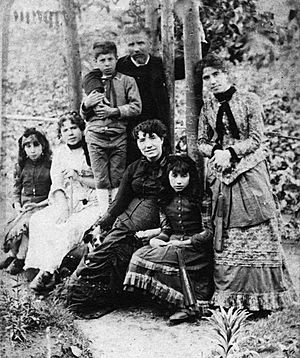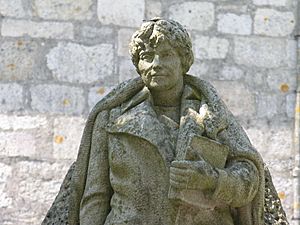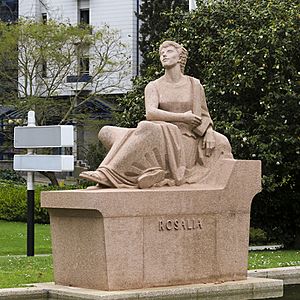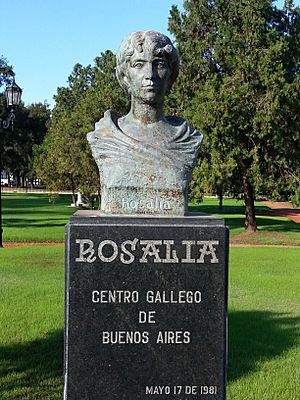Rosalía de Castro facts for kids
Quick facts for kids
Rosalía de Castro
|
|
|---|---|
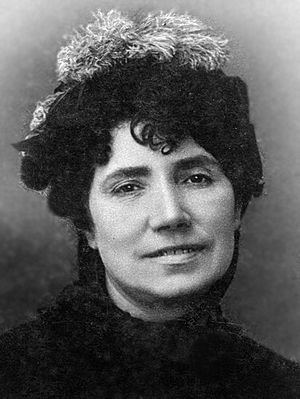 |
|
| Born | María Rosalía Rita de Castro 23 February 1837 Santiago de Compostela, Galicia, Spain |
| Died | 15 July 1885 (aged 48) Padrón, Galicia, Spain |
| Occupation | Poet |
| Language | |
| Citizenship | Spanish |
| Period | Romanticism |
| Literary movement | Rexurdimento |
| Spouse | Manuel Murguía |
| Signature | |
 |
|
María Rosalía Rita de Castro (Galician pronunciation: [rosaˈli.ɐ ðɪ ˈkastɾʊ]; February 23, 1837 – July 15, 1885) was a very important poet and writer from Galicia, Spain. She is known as one of the most significant figures in 19th-century Spanish literature. Rosalía de Castro helped bring the Galician language back into literature after a long period. Her writings often showed strong feelings about Galician identity and culture. She also wrote about women's rights and challenged old ideas about female writers. She is still seen as a major cultural hero in Galicia.
Contents
Rosalía's Life Story
Rosalía de Castro wrote in both Galician and Spanish. She became a key person in the Galician Romantic movement, called the Rexurdimento (which means "Renaissance" or "Rebirth"). This happened after a time known as the Séculos Escuros (Dark Centuries), when the Galician language was not used much in writing. Her poems often express saudade, a special feeling of longing, nostalgia, and a bit of sadness.
She married Manuel Murguía, who was a historian, journalist, and a member of the important Royal Galician Academy. He also helped edit her books. Rosalía and Manuel had seven children: Alexandra, Aura, twins Gala and Ovidio, Amara, Adriano, and Valentina. Sadly, only two of her children married, and none of them had children. So, today there are no direct descendants of Rosalía de Castro. Her son Ovidio was a talented painter, but he passed away young.
Rosalía published her first collection of poems in Galician, called Cantares gallegos ("Galician Songs"), on May 17, 1863. This date is now celebrated every year as the Día das Letras Galegas ("Galician Literature Day"). Since 1963, this special day honors a different writer who writes in the Galician language. It is an official holiday in Galicia.
Rosalía's life was often difficult, marked by poverty and sadness. However, she cared deeply about poor and helpless people. She strongly spoke out against unfair power and was a passionate supporter of women's rights. Rosalía suffered from uterine cancer and passed away in Padrón, Spain, on July 15, 1885.
She is buried in the Panteón de Galegos Ilustres (Pantheon of Illustrious Galicians). This special burial place is in the Convent of San Domingos de Bonaval in Santiago de Compostela, Spain.
Her Lasting Impact
Rosalía de Castro is now one of the most honored poets in Galicia. Even though she was expected to write in Spanish, she bravely chose to write her early poems in Galician. Many people at the time thought Galician was just a simple dialect for uneducated people. But Rosalía's choice earned her the love and respect of everyday people who spoke Galician at home.
Many things are named after her, showing her huge influence. You can find schools in Galicia, Spain, Russia, and Uruguay named after her. There are also libraries, cultural groups, awards, parks, and even a professional sports team. Monuments to her stand in many places, both in Spain and other countries. A theater, restaurants, a type of white wine, and even a former banknote and postage stamp have carried her name. An Iberia airplane and a sea-rescue plane are also named after her.
Global Reach of Her Works
Rosalía de Castro's poems have been translated into many languages around the world.
- In English, her Galician Songs and New Leaves were translated by Erín Moure. Other English translations have also been published, making her work available to more readers.
- In Japan, the first collection of her poems was translated in 2009 by Takekazu Asaka.
- In Portuguese, an anthology of her Galician poems was translated by Andityas Soares de Moura in 2008. There is also a statue honoring her in Porto, Portugal.
- In French, an anthology of her Galician poems was translated by Jose-Carlos Gonzalez in 2003.
Honors and Recognition
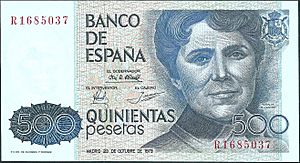
Rosalía de Castro's name is used for many places and things, showing how much she influenced society. Today, schools and universities in Galicia, other parts of Spain, Russia, Venezuela (Teatro Rosalía de Castro), and Uruguay are named after her. You can also find parks, plazas, streets, cultural groups, and awards named in her honor. There's even a wine called Rías Baixas that uses her name.
Both an Iberia airline plane and an aircraft from the Maritime Safety and Rescue Society are named Rosalía de Castro. Many monuments, plaques, and sculptures around the world are dedicated to her.
On October 23, 1979, the last 500 peseta banknote was printed with Rosalía de Castro's portrait on it. This made her, besides Queen Isabella I, the only non-royal woman to appear on the front of a Spanish banknote. The back of the bill showed her house-museum in Padrón and some handwritten lines from her book Follas Novas.
In 2019, the International Astronomical Union named a star, HD 149143, after Rosalía de Castro. This was part of a special contest called NameExoWorlds.
Her Published Works
Here are some of the books and poems Rosalía de Castro wrote:
Poems in Galician
- Cantares gallegos (1863)
- Follas novas (1880)
Stories in Galician
- Contos da miña terra I (1864)
Poems in Spanish
- La Flor (1857)
- A mi madre (1863)
- En las orillas del Sar (1884)
Stories in Spanish
- La hija del mar (1859)
- Flavio (1861)
- El cadiceño (1863)
- Ruinas (1866)
- Las literatas (1866)
- El caballero de las botas azules (1867)
- El primer loco (1881)
- El domingo de Ramos (1881)
- Padrón y las inundaciones (1881)
Music Inspired by Her Poems
Many composers have set Rosalía de Castro's poems to music:
- Osvaldo Golijov used "Lua descolorida" in his "Three Songs for Soprano and Orchestra" (2002).
- Antón García Abril created Cuatro canciones sobre textos gallegos (1957–1962).
- Octavio Vazquez set "En Cornes" and "Como Chove Miudiño" to music.
- Adolfo Salazar composed "Tres Poemas de Rosalía de Castro" (1915) for voice and piano.
See also
 In Spanish: Rosalía de Castro para niños
In Spanish: Rosalía de Castro para niños
 | Audre Lorde |
 | John Berry Meachum |
 | Ferdinand Lee Barnett |


